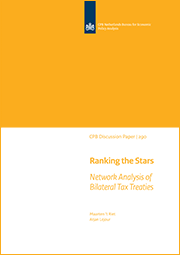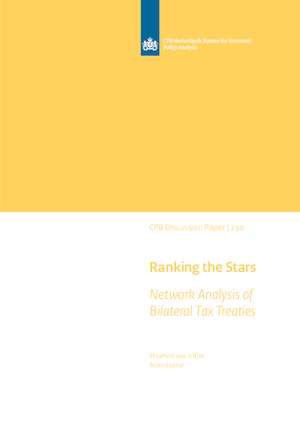Ranking the Stars: Network Analysis of Bilateral Tax Treaties
Tax treaty shopping beneficial

This result is found by researchers Maarten van ’t Riet and Arjan Lejour of CPB Netherlands Bureau for Economic Policy Research, using a novel method applied to a network of tax treaties for 108 countries. The United Kingdom heads the list of central countries in the international tax network, while the Netherlands is ranked fourth.
The network analysis takes account of the double tax relief methods that countries apply, as well as bilateral tax treaties. Their desired effect indeed materializes: a substantial reduction of possible double taxation on international dividends. If multinationals use the potential treaty benefits by structuring their tax liabilities through conduit countries, they reduce their tax burden even further. The worldwide average remaining double tax rate is 6 percent. This comes on top of the corporate income tax due in the host country of the investments.
For some countries all tax revenues on international dividends disappear as a consequence of treaty shopping, while the additional tax revenues for conduit countries are less than half percent of worldwide dividend flows.
A policy simulation with the network method demonstrates that treaty shopping has a strong dampening effect on the double tax rates for multinationals. This suggests that possible actions against tax avoidance on dividend flows requires large scale international cooperation.
Read the publication CPB Discussion Paper 290 and the accompanying CPB Background Document.
Contacts


Read the accompanying background documents A and B.
With a novel approach this paper sheds light on the international tax planning possibilities of multinationals. The international corporate tax system is considered a network, just like for transportation, and ‘shortest’ paths are computed, minimizing tax payments for the multinationals when repatriating profits.
The network consists of 108 jurisdictions, and the ‘shortest’ paths are constructed from the rates of corporate income taxes, withholding taxes on dividends and the double taxation relief methods. Double taxation treaties typically lower bilateral withholding taxes. The possibility to funnel investments through a third country to take advantage of treaty provisions, treaty shopping, is found to lead to an average potential reduction of the combined effective tax rate of more than 6 percent. On average, multinationals need only pay taxes of 6 percent, after the corporate income tax in the host country. Moreover, the network approach identifies the countries which are most likely to perform the role of conduits. The United Kingdom heads the rankings of three out of four network centrality measures. The tax revenues on dividends for the conduit countries are less than a half percent of the worldwide flows. Finally, a crackdown on tax havens is simulated. The impact is found to be modest, both on the tax reduction and on network centrality. The result illustrates the strong dampening effect treaty shopping has on the remaining double tax rates.
Downloads
Authors


